Elimination in Biology
Elimination is the process by which the body expels waste products that are no longer needed. In the context of biology, elimination refers to the removal of waste products from the body, primarily through the excretory system.
Key Concepts
- Excretory System: The excretory system is responsible for eliminating waste products from the body. It includes organs such as the kidneys, liver, lungs, and skin.
- Types of Waste: The body eliminates various types of waste, including metabolic waste (such as urea and carbon dioxide) and non-metabolic waste (such as excess salts and water).
- Organs Involved: The kidneys play a central role in eliminating waste products through the production of urine. The liver is involved in the breakdown of toxins and the production of bile, while the lungs eliminate carbon dioxide through respiration.
- Regulation: The process of elimination is tightly regulated by the body to maintain homeostasis. Hormones such as antidiuretic hormone (ADH) and aldosterone play a role in regulating urine production and electrolyte balance.
- Disorders: Disorders related to elimination include kidney disease, liver failure, and respiratory conditions that affect the body's ability to eliminate waste products.
Study Guide
- What is the role of the excretory system in eliminating waste from the body?
- Describe the process of urine production in the kidneys and its role in waste elimination.
- Explain the significance of maintaining electrolyte balance in the body's elimination process.
- Discuss the impact of kidney and liver disorders on the body's ability to eliminate waste products.
- Compare and contrast the mechanisms of waste elimination in the kidneys, liver, lungs, and skin.
◂Biology Worksheets and Study Guides High School. Human biology II
Worksheet/Answer key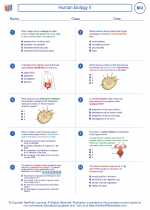 Human biology II
Human biology II  Worksheet/Answer key
Worksheet/Answer key Human biology II
Human biology II  Worksheet/Answer key
Worksheet/Answer key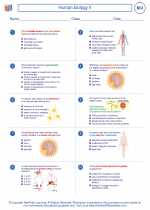 Human biology II
Human biology II  Vocabulary/Answer key
Vocabulary/Answer key Human biology II
Human biology II  Vocabulary/Answer key
Vocabulary/Answer key Human biology II
Human biology II  Vocabulary/Answer key
Vocabulary/Answer key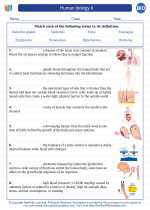 Human biology II
Human biology II  Vocabulary/Answer key
Vocabulary/Answer key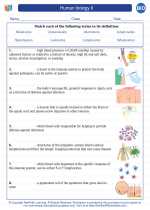 Human biology II
Human biology II  Vocabulary/Answer key
Vocabulary/Answer key Human biology II
Human biology II  Vocabulary/Answer key
Vocabulary/Answer key Human biology II
Human biology II  Vocabulary/Answer key
Vocabulary/Answer key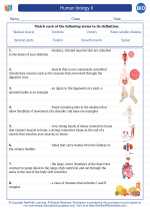 Human biology II
Human biology II 

 Worksheet/Answer key
Worksheet/Answer key
 Worksheet/Answer key
Worksheet/Answer key
 Vocabulary/Answer key
Vocabulary/Answer key
 Vocabulary/Answer key
Vocabulary/Answer key
 Vocabulary/Answer key
Vocabulary/Answer key
 Vocabulary/Answer key
Vocabulary/Answer key
 Vocabulary/Answer key
Vocabulary/Answer key
 Vocabulary/Answer key
Vocabulary/Answer key
 Vocabulary/Answer key
Vocabulary/Answer key

The resources above cover the following skills:
LIFE SCIENCE (NGSS)
From Molecules to Organisms: Structures and Processes
Students who demonstrate understanding can:
Develop and use a model to illustrate the hierarchical organization of interacting systems that provide specific functions within multicellular organisms.
Plan and conduct an investigation to provide evidence that feedback mechanisms maintain homeostasis.